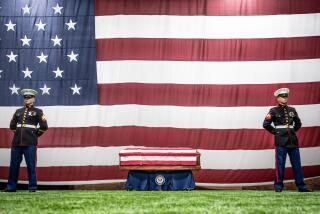Determined Father Demands Justice for Son’s Killers in El Salvador
- Share via
OWENSBORO, Ky. — Eight years have passed since a U.S. Army transport helicopter was shot down while flying over El Salvador and its three crewmen were killed, one by the impact of the crash and two by Salvadoran rebels on the ground.
At first, rebel officials denied involvement. Then they singled out two men as responsible and promised “revolutionary justice.” In the end, the Supreme Court in El Salvador granted the two men amnesty.
Now Ed Pickett, father of one of the slain crewmen, Lt. Col. David Pickett, is seeking justice for his son as well as a greater degree of safety for U.S. military personnel who serve overseas.
The elder Pickett praised his son as a dedicated officer and a caring family man who left a wife and three young children.
Lessening the burden for other military families is his goal, he says, as he seeks a congressional resolution asking the government of El Salvador to amend its constitution to permit extradition of his son’s accused killers.
“Our hope is that we can bring these guys back to the United States to receive justice,” said Steve Susens, press secretary for Rep. Ed Bryant (R-Tenn.), with whom the elder Pickett has worked on the legislation.
But, Susens said, that’s only part of the resolution that Bryant hopes to introduce soon. It also urges the U.S. government to improve legal protections for its military personnel on foreign soil, and for their families. It seeks to initiate changes in the Geneva Convention and other international agreements that would prohibit amnesty in the case of grave breaches of such accords, such as killing unarmed military personnel.
Though the same resolution died in a House committee last year, Susens hopes it will be adopted this time.
“We can’t have these sorts of crimes happening to American citizens,” he said.
Rene Leon, El Salvador’s ambassador to the United States, said the administration of President Armando Calderon Sol supports modifying that nation’s constitution to allow the Salvadoran government to enter into extradition treaties with the United States and other nations.
In April 1998, the previous Legislative Assembly of El Salvador approved such a constitutional change. Under Salvadoran law, the current assembly must ratify it by May 2000 for it to be enacted.
“Of course, this is solely in the hands of the national assembly of El Salvador,” Leon said in a telephone interview from Washington. “Only once this political process in our national assembly is finished can we go ahead and negotiate.”
But Orlando Perez, a political science professor at Central Michigan University and an expert on U.S.-Latin American relations, said he expects little to come of the resolution.
“Based on my knowledge of Salvadoran politics and these kinds of resolutions, I find it hard to believe that the Salvadoran government would reform its constitution” in response, Perez said.
David Pickett’s widow, Rosemary Griggs, was a lieutenant colonel in the Army at the time of her husband’s death Jan. 2, 1991. A nurse stationed at Ft. Campbell’s Blanchfield Army Community Hospital, she retired a year later to stay home with their three children, ages 10, 7 and 4 at the time of their father’s death.
Now 47, Griggs, her daughter and two sons live in Clarksville, Tenn., as they did before her husband’s death.
“It was a scary time for them because they were so young,” said Griggs, who has not remarried.
David Pickett, a 17-year Army veteran, was a native of Cavendish, Vt., and a graduate of the U.S. Military Academy at West Point, N.Y.
He was commander of the 228th Aviation Regiment of the Army’s 4th Battalion stationed in Honduras, which borders El Salvador, when he was killed. He previously had been stationed at Ft. Campbell.
Pickett, 40, and the other two men on the UH-1 helicopter, Chief Warrant Officer Daniel S. Scott, 39, of San Diego, and Sgt. 1st Class Earnest G. Dawson, 20, of Bolingbrook, Ill., were shot down while returning to their base in Soto Cano, Honduras, after flying an officer to San Salvador. Pickett and Scott were the pilots; Dawson was a mechanic.
Scott was killed when the helicopter crash-landed after being hit by gunfire. Climbing out of the craft, Pickett and Dawson were killed by rebels from the Farabundo Marti National Liberation Front.
More to Read
Sign up for Essential California
The most important California stories and recommendations in your inbox every morning.
You may occasionally receive promotional content from the Los Angeles Times.













